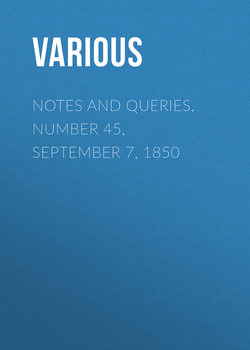Читать книгу Notes and Queries, Number 45, September 7, 1850 - Various - Страница 2
NOTES
LORD PLUNKET AND SAINT AGOBARD
ОглавлениеSome of your readers may remember a speech in parliament by, as I think, Lord Plunket, in which his lordship argued with great eloquence in behalf of the Bill for the Emancipation of the Roman Catholics. Among many passages therein of equal truth and rhetorical power, there was one long afterwards much quoted, paraphrased, and praised. It was that in which he reminded the House, that those for whom he pleaded were fellow-subjects of the same race, offspring of the same Creator, alike believers in the One true God, the equal recipients of His mercies, appealing for His blessings though the medium of the same faith, and looking forward for salvation to the One Intercessor, Mediator, and Sacrifice for all,—men, who, as they did, addressed the Eternal in the form of that "Universal prayer"—Our Father—the authority and the privilege of one common parentage, offered by the all in the union of the same spirit, in the conviction of the same wants, in the aspiration of the same hope. I say, I think Lord Plunket so spoke, for I write from memory dating from the period when George the Third was king. Now be this so: according to the dogmas of some critics, Lord Plunket may be convicted of an eloquent plagiary. Read the following extract from a missive by S. Agobard, to be found in the Bibl. Vet. Patrum, tome xiii, page 429., by Galland, addressed "Ad præfatum Imperatorem, adversus legem Gundobadi et impia certamina quæ per eam geruntur," and say whether, in spite of the separation of centuries, there does not appear a family likeness, though there were no family acquaintance between them; Saint Agobard being Bishop of Lyons in the ninth century, and Lord Plunket Attorney-General for Ireland in the nineteenth.
The Saint is pleading against the judical ordeal:
"Illi autem profecti, prædicaverunt ubique Domino cooperante; annuntiataque est ab eis omni creaturæ; id est, cunetis nationibus mundi; una fides indita per Deum, una spes diffusa per Spiritum Sanctum in cordibus credentium, una caritas nata in omnibus, una voluntas, accensum unum desiderium, tradita una oratio; ut omnes omnino ex diversis gentibus, diversis conditionibus, diverso sexu, nobilitate, honestate, servitute diversa, simul dicant uni Deo, et Patri omnium; Pater Noster qui es, &c., sicut unum Patrem invocantes, ita unam santificationem quærentes, unum regnum postulantes, unam adimpletionem voluntatis ejus, sicut fit in coelo optantes; unum sibi panem quotidianum dari precantes et omnibus dimitti debita."
To which other passages might be added, as, in fact, S. Agobard pursues the one idea until he hunts it down to the one effect of sameness and common antithesis. Should we say Lord Plunket had read these passages, and is thereby convicted of eloquent plagiary? I say, No! Lauder then equally convicted Milton of trespassing on the thoughts of others, by somewhat apposite quotations from the classics. We are, in truth, too much inclined to this. The little, who cannot raise themselves to the stature of the great, are apt to strive after a socialist level, by reducing all to one same standard—their own. Truth is common to all ages, and will obtain utterance by the truthful and the eloquent throughout all time.
S.H.
Athenæum, August 12.
